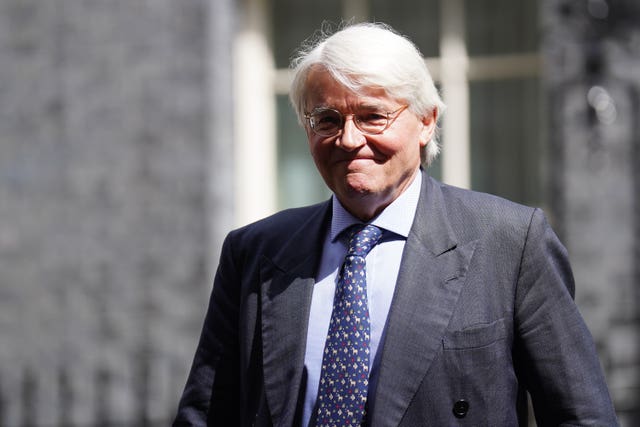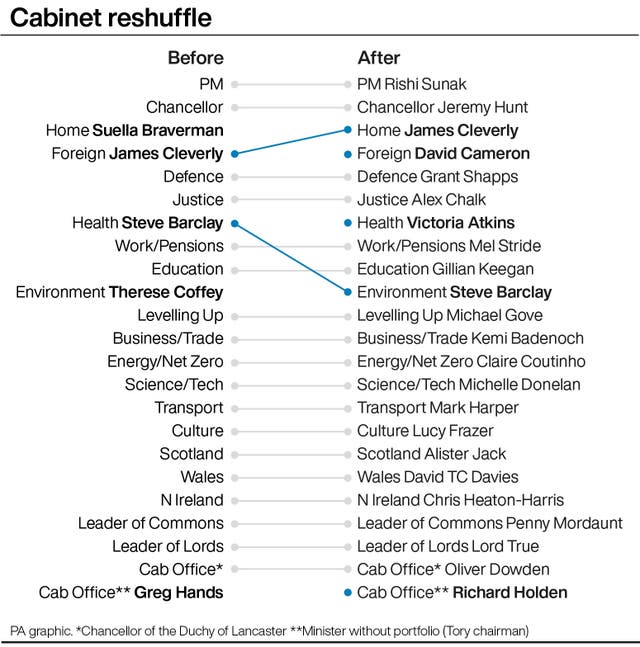David Cameron has insisted that the Greensill controversy is “in the past”, amid questions about how MPs will scrutinise the new Foreign Secretary while he sits in the House of Lords.
The former prime minister will avoid regular grillings by MPs because of his position in the House of Lords, with the relatively unusual arrangement prompting the Commons Speaker to promise that he will “do everything” to ensure Lord Cameron can be questioned by elected representatives.
Downing Street has insisted that there is “precedent” for the appointment of a peer to a senior Cabinet role, but the move by Rishi Sunak has nonetheless raised questions about accountability.
Lord Cameron on Monday faced immediate questions about the Greensill Capital scandal, where it emerged that he privately lobbied ministers to attempt to try to secure access to an emergency coronavirus loan scheme for the failed firm, where he took up a role in 2018.
The furore prompted a widespread look at lobbying in Westminster and saw strong criticism of Lord Cameron’s “significant lack of judgment” by the Treasury Committee.
“All those things were dealt with by the Treasury Select Committee, and other inquiries at the time,” the new Cabinet minister told broadcasters.
“As far as I am concerned, that is all dealt with and in the past. I now have one job, as Britain’s Foreign Secretary.”
He said that he had now resigned from his role as president of Alzheimer’s Research UK and all other positions.
“The other things I’ve been doing, including being a professor at NYU (New York University), that all stops,” he said.
Sir Lindsay Hoyle told MPs earlier that he had commissioned advice following Lord Cameron’s appointment, which would also mean that major statements were either made first in the upper chamber by him or by a less senior minister in the Commons.
Lord Cameron would face questions from elected MPs only when he appeared before select committees.

“This is not the first time in recent years that a Cabinet minister has been appointed in the House of Lords. But given the gravity of the current international situation, it is especially important that this House is able to scrutinise the work of the Foreign, Commonwealth and Development Office effectively,” he told the Commons.
“I have therefore commissioned advice from the clerks about possible options for enhancing (scrutiny) of the work of the Foreign Secretary when that post is filled by a member of the other House.
“I also look forward to hearing the Government’s proposals on how the Foreign Secretary will be properly accountable to this House.”
Lord Cameron and Downing Street sought to stress that he would still be held accountable, despite MPs not being able to question him on the floor of the Commons.
“I will be held to account in the House of Lords where I have to account for myself and the Government,” he told broadcasters.
David Cameron was a disastrous PM. This is a last gasp act of desperation from a government devoid of talent and ideas.
Amid international crisis, Sunak has chosen an unelected failure from the past who MPs cannot even hold to account.
Only Labour offers the change we need.
— David Lammy (@DavidLammy) November 13, 2023
He said Foreign Office minister Andrew Mitchell and others would be able to represent the Foreign Office in the Commons, adding: “This Government, my role in it, all of that will be accountable to the electorate at the general election when it comes.”
Number 10 also said that Mr Sunak faced MPs every week and could answer MPs on foreign policy.
But shadow foreign secretary David Lammy was among those criticising the situation.
The Labour MP said that during an “international crisis”, the Prime Minister “has chosen an unelected failure from the past who MPs cannot even hold to account”.
The Institute for Government’s senior researcher Dr Alice Lilly said it was “highly unusual” for secretaries of state to serve in the Lords – the last was Baroness Morgan as culture secretary as an interim measure in 2019/20 – and it was more than 40 years since a foreign secretary was in the upper chamber.

During Gordon Brown’s administration, Lord Mandelson served as business secretary and Lord Adonis as transport secretary.
Downing Street confirmed that Lord Cameron, who is believed to be entitled to a salary of around £104,000 as a secretary of state in the Lords, would not draw an attendance salary in the upper chamber.
Neither would he receive the £115,000 annual allowance available to former prime ministers to run their office while he remained in post.
Mr Cameron would also not claim the Lords Office Holder Allowance of £36,366, which is intended to cover costs such as commuting for ministers outside London.





Comments: Our rules
We want our comments to be a lively and valuable part of our community - a place where readers can debate and engage with the most important local issues. The ability to comment on our stories is a privilege, not a right, however, and that privilege may be withdrawn if it is abused or misused.
Please report any comments that break our rules.
Read the rules here